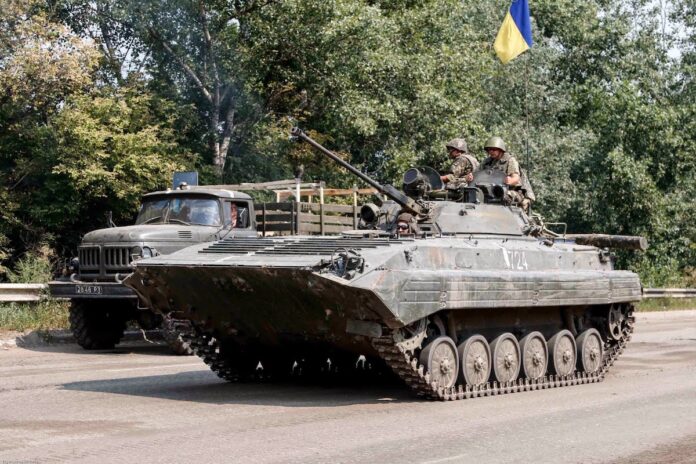In the late afternoon of Monday 21 February, Vladimir Putin signed the decree recognizing the independence of the two separatist republics of Luhansk and Donetsk in the Donbass region. This happenend in the presence of the the major world media. By doing this, the Russian premier effectively canceled the 2015 Minsk agreement which protected the territorial unity of Ukraine, providing for a special statute for the two republics. At the same time, the Russian premier signed “friendship and cooperation” agreements with the representatives of the two provinces.
Such signature followed quickly a speech with which Putin condemned NATO’s policy in Europe and Kiev’s refusal to grant autonomy to the Russian-speaking population of Eastern Ukraine. The document also provides for the entry of Russian contingents into that area, with the aim of restoring peace in an area that had caused 13,000 deaths in the clashes between Ukrainians and pro-Russians. During the night a long column of Russian armored vehicles reached Donetsk.
What are the consequences? The Ukrainian government is unlikely to accept this and a military reaction is extremely possible. We have also to consider that the EU and the United States threaten to operate long-foreseen sanctions against Moscow. Some European Union countries are heavily dependent on Russian gas for their energy supplies. It is therefore likely that the counter-sanctions that Moscow would imposed have a significant weight in the positions that each individual government could take on. Putin underlined Russia’s intention to protect its territorial security in the face of the eastward advance of NATO troops, already underway in Poland and Romania. Ukrainian President Volodymyr Zelensky has declared that his country’s borders do not change and that he will work for a political and diplomatic solution.
Anger and fear paint the faces of the civilian population already affected by years of conflict. As the bombings become more frequent and heavy, the displacement of the most affected areas begins. Some decide to cross the Russian border and seek hospitality in the area around the city of Rostov, others move West to Lviv which, for the moment, remains outside the fighting area. The Russian media reports that groups of “volunteers” are asking to be allowed to participate in the “liberation war” of Luhansk and Donetsk, but it is said that most of them are mercenaries.
________________________________________________________________________
Nel tardo pomeriggio di lunedì 21 febbraio Vladimir Putin di fronte alle telecamere dei maggiori media del mondo, ha firmato il decreto con il quale lo Stato russo riconosce l’indipendenza delle due repubbliche separatiste di Luhansk e Donetsk nella regione del Donbass. Con questo atto il premier russo ha di fatto cancellato l’accordo di Minsk del 2015 che tutelava l’unità territoriale dell’Ucraina, pur prevedendo per le due repubbliche uno statuto speciale. Contestualmente il premier russo ha firmato accordi di “amicizia e cooperazione” con i rappresentanti delle due province.
La firma del documento è stata preceduta da un discorso in cui Putin ha condannato la politica della Nato in Europa e la renitenza di Kiev a concedere margini di autonomia alla popolazione russofona dell’Est dell’Ucraina. Il documento prevede anche l’ingresso di contingenti russi nell’area, allo scopo di ristabilire la pace in un’area che ha fatto registrare 13.000 morti negli scontri fra ucraini e filorussi. Nel corso della notte una lunga colonna di blindati russi ha raggiunto Donetsk.
Quali le conseguenze? Difficilmente il governo ucraino potrà accettare il dato di fatto e una reazione militare è estremamente probabile. Altrettanto lo è l’applicazione delle sanzioni previste da tempo contro Mosca da parte della Ue e degli Stati Uniti. Alcuni Paesi dell’Unione Europea riguardo alle loro forniture energetiche dipendono pesantemente dal gas russo. È quindi probabile che le controsanzioni che sarebbero comminate da Mosca abbiano un peso rilevante nelle prese di posizione dei singoli governi. Putin ha sottolineato l’intento della Russia di tutelare la sua sicurezza territoriale di fronte all’avanzata verso Est delle truppe della Nato, già in atto in Polonia e in Romania. Il presidente ucraino Volodymyr Zelensky ha dichiarato che i confini del suo Paese non cambiano e che si adopererà per una soluzione politica e diplomatica della crisi.
Collera e paura dipingono i volti della popolazione civile già provata da anni di conflitto. Mentre i bombardamenti diventano sempre più frequenti e più pesanti, inizia lo sfollamento delle zone più colpite. Alcuni decidono di attraversare il confine russo e cercare accoglienza nella zona intorno alla città di Rostov, altri si spostano a Ovest verso Leopoli che, per il momento, resta fuori dall’area degli scontri. I media russi informano che gruppi di “volontari” chiedono di poter partecipare alla “guerra di liberazione” di Luhansk e Donetsk, ma è opinione comune che si tratti in buona parte di mercenari.
Leggi anche:








